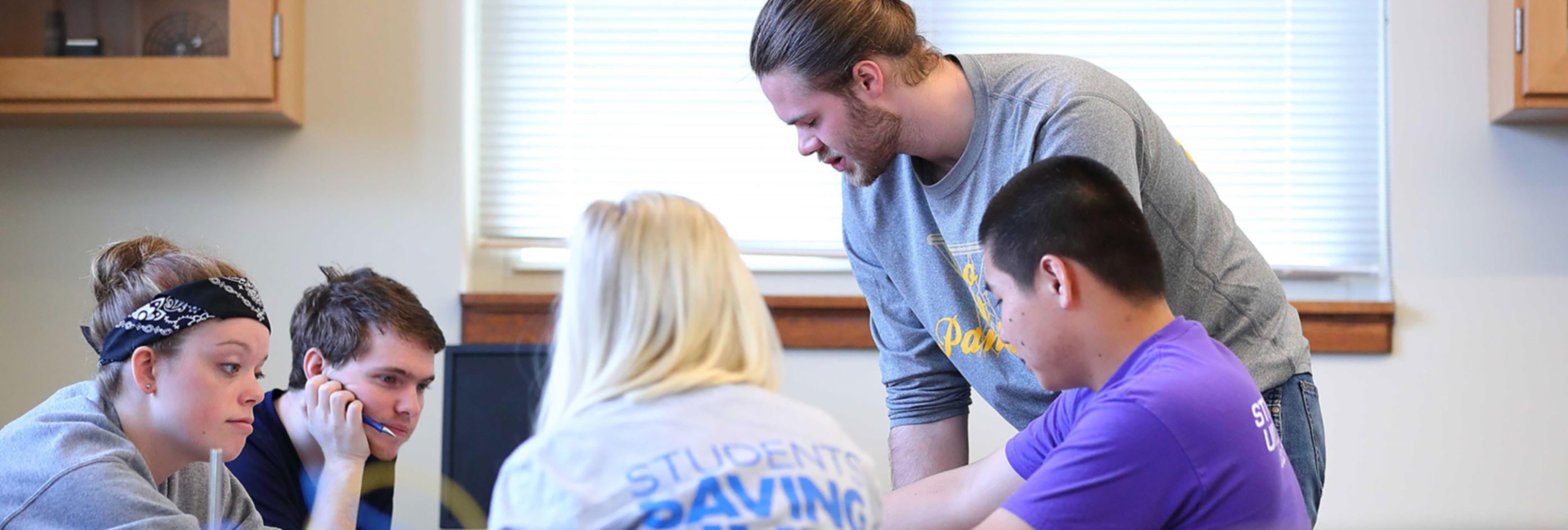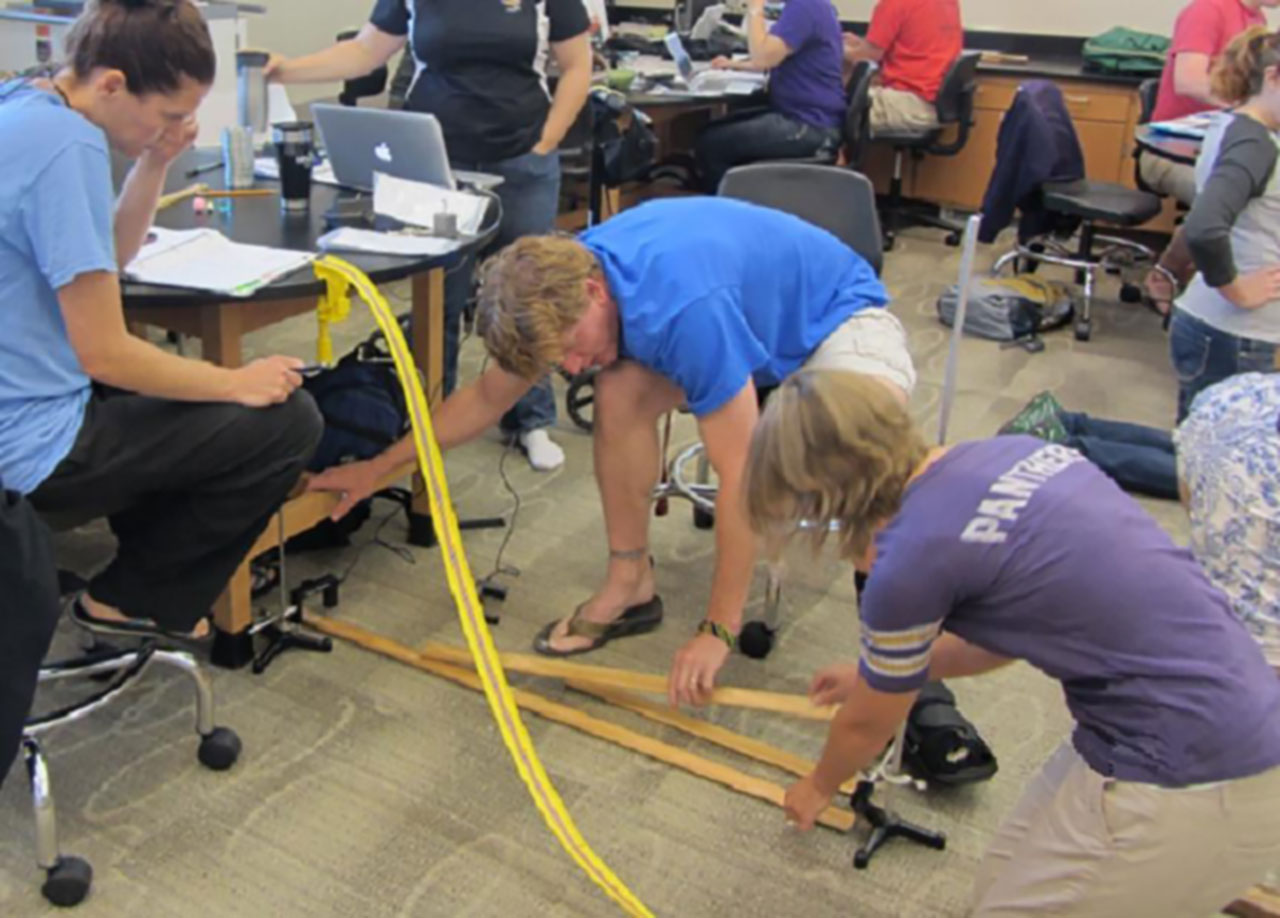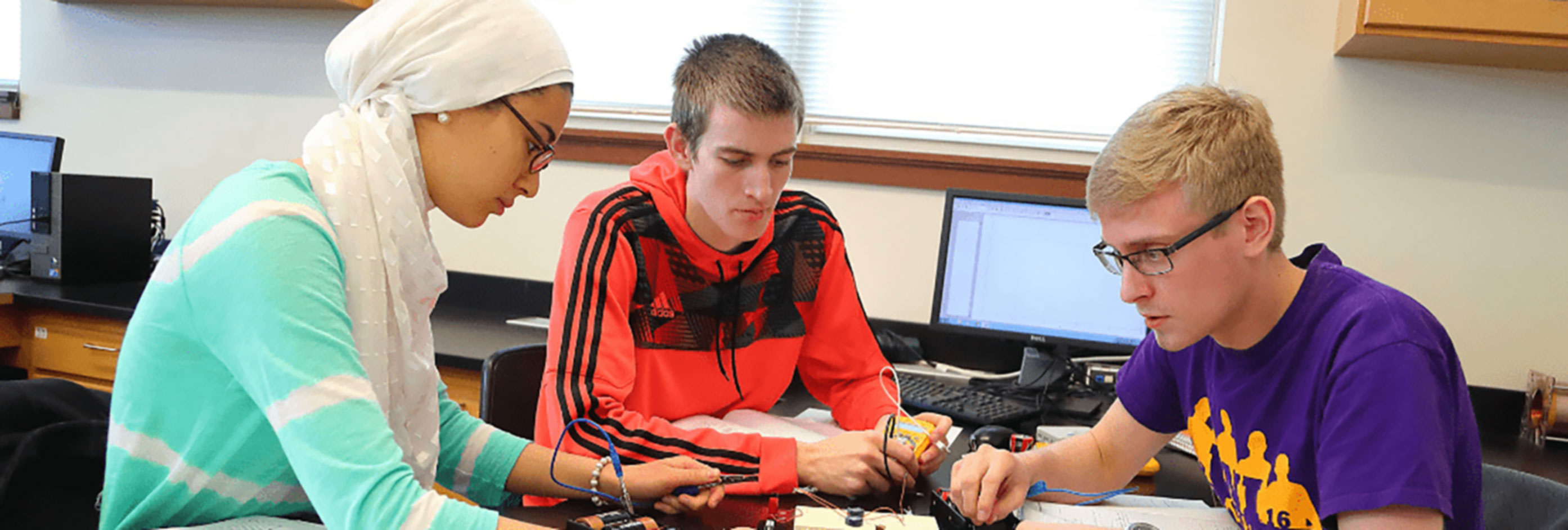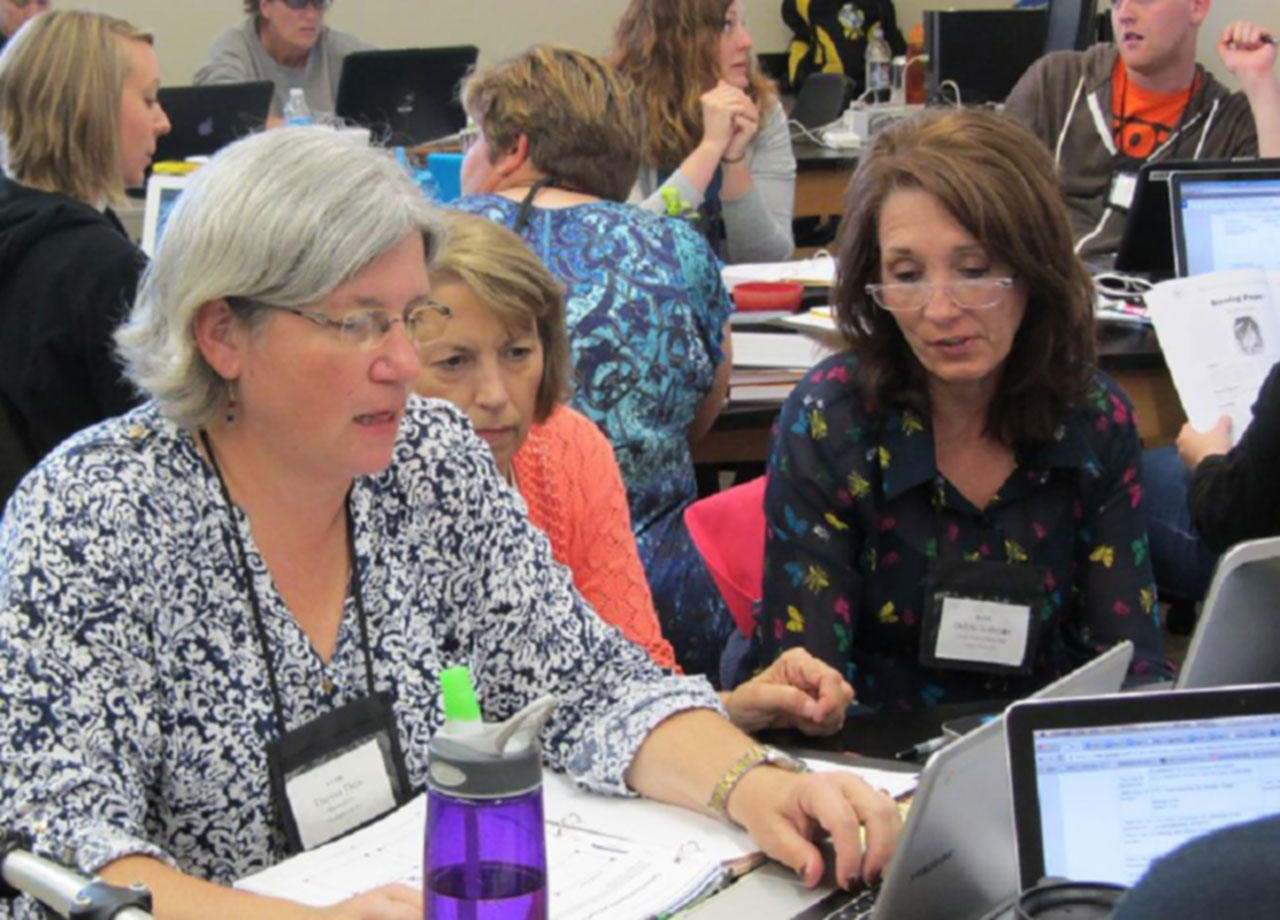PRISMS
Curriculum designed by educators, for educators
PRISMS PLUS is an internationally-recognized high school physics curriculum developed by professors in the Physics and Science Education departments at UNI.
PRISMS PLUS has had a major impact on the teaching of physics in nearly 1500 high schools in the U.S. and abroad. It also has had an impact in preparing future and existing teachers to teach high school physics.
PRISMS PLUS for students provides 44 complete learning cycles in four units. Each learning cycle includes original laboratory activities for exploration, concept development, and application plus the concept enhancer and conceptual practice support materials students need to complete their understanding. PRISMS PLUS was developed by Timothy Cooney, Lawrence Escalada, and Roy Unruh in collaboration with master high school physics teachers with support in part by the National Science Foundation under grant # ESI-9730586.
The comprehensive PRISMS PLUS teacher resources assist you in providing the learning environment you want where students can fully develop and apply their understanding of physics concepts.

How did PRISMS get started?
PRISMS (Physics Resources and Instructional Strategies for Motivating Students) was originally launched in 1987, and was made available to teachers through a variety of funding sources including the National Science Foundation and the U.S. Department of Education. PRISMS has been validated by the U.S. Department of Education’s National Diffusion Network and the Iowa Professional Development Model Content Network.
In its original form, PRISMS consisted of a teacher’s manual and a computer test bank featuring 2,000 questions and was not intended to replace textbooks. The teacher's manual contained approximately 130 student activities, encompassing an entire year of high school physics instruction.
The latest generation, PRISMS PLUS, utilizes an enhanced learning cycle pedagogy in which students engage in explorations prior to introduction of abstract concepts. After the concepts have been introduced within the context of these explorations, students are then provided with additional activities that are opportunities to apply what they have learned to real-life experiences.
The current version includes activities and exercises that are designed to develop conceptual understanding of the major physics ideas being introduced, engage students in scientific inquiry, and cultivate scientific reasoning and problem-solving skills.
Want to know more about the history of PRISMS?

PRISMS PLUS
The focus of the new PRISMS PLUS is complete learning cycles. A complete learning cycle is one that provides fully integrated experiences that enable students to develop not only their problem-solving and inquiry skills but also a deep, long-lasting understanding of physics concepts.
PRISMS PLUS consists of 44 learning cycles that are divided into the following units:
- Force and Motion (14 cycles)
- Work and Energy (8 cycles)
- Waves and Optics (12 cycles)
- Electricity, Magnetism, and Modern Physics (10 cycles)
Three Types of Activities
Exploration, concept development, and application, present students with problems that engage them in scientific inquiry and call them to apply their observations to the concepts being introduced and to real-life applications. In the exploration activities, students make predictions and observations and discover patterns and relationships. The concept development activities provide opportunities for students to develop concepts within the context of what they have observed. The application activities provide students with a means to apply their understanding of concepts to new situations and real-life problems.
Each activity includes questions that provide a focus for students to link their observations and data with physics ideas and concepts. These questions also provide an opportunity for students to reflect on what they have learned and observed. Each activity also includes an extension that provides students with suggestions to make further observations, collect data, and arrive at evidence-based conclusions about the concepts being addressed.
Concept Support Materials
Each learning cycle’s Concept Enhancer is a one- to three-page student reading that contains references to observations and connections between concepts and phenomena that students should have shared in the exploration and concept development activities. Other relevant examples are also provided and discussed. The Concept Enhancer is carefully written to help facilitate the transition students must make from the observations they have made and the patterns and relationships they have discovered in the exploration activity to the development of the desired concept in the concept development activity. Conceptual Practice exercises provide students with opportunities to use their newly acquired knowledge and skills to analyze additional situations. These exercises give students practice in answering questions and solving problems that are conceptual in nature.
The Concept Enhancer and Conceptual Practice immediately follow the exploration and concept development activities but come prior to the application activity.
Student Materials
Multiple activities carefully ordered and targeted concept support materials make PRISMS PLUS the curriculum resource your students need. Using inexpensive materials with an activity-based pedagogy, you’ll generate interest and enthusiasm among students and teachers for the study of physics.

Learning Cycle Teacher Notes
These teacher notes provide you with information and strategies on how to begin and how to wrap up a learning cycle.
- Getting Started teacher notes provide the following:
- An overview of the concepts that will be introduced and the activities that make up the learning cycle.
- National Science Education Standards (5-8 and 9-12) and Benchmarks for Science Literacy (6-8 and 9-12) that are being addressed. Although PRISMS PLUS was developed before the Next Generation Science Standards (NGSS), you will find it to be aligned with the NGSS.
- Prerequisite knowledge and skills needed by students to complete the learning cycle.
- Suggestions for setting the stage for student learning that focus on problems, issues, or questions about phenomena that are interesting and/or familiar to students. These suggestions provide students with a sense of what they are about to do in the learning cycle.
- Information for taking account of student ideas that are commonly held about physical phenomena related to the learning cycle. This information contains suggestions on how to help students confront inconsistencies in their previously held ideas and their observations.
- An overview of the concepts that will be introduced and the activities that make up the learning cycle.
- Wrapping It Up teacher notes provide the following:
- Suggestions on building the case and promoting student reflection. After completing the learning cycle, students can draw from their experiences to develop an evidence-based argument for the Standards or Benchmarks that have been addressed. This section also provides suggestions on how student understanding can be assessed. It contains suggestions on how the students can reflect on what they have learned, how their initial ideas have changed, and how they can use their understanding in new situations.
- Thought-provoking questions and suggestions for extending student knowledge and promoting open inquiry. This section includes further investigations students might conduct that would allow them to apply their understanding to new observations and situations.
- Suggestions on building the case and promoting student reflection. After completing the learning cycle, students can draw from their experiences to develop an evidence-based argument for the Standards or Benchmarks that have been addressed. This section also provides suggestions on how student understanding can be assessed. It contains suggestions on how the students can reflect on what they have learned, how their initial ideas have changed, and how they can use their understanding in new situations.
Activity Teaching Notes and Answers
Specific activity teaching notes and answers to student edition questions are provided.
- This section includes the following:
- Information to help teachers make informed decisions on how the activity could be implemented and adapted for their classrooms
- Information about the ease of lab setup and calculations, the reliability and interest level, and the scientific process and reasoning skills being used
- A list of materials used in the activity, how to set up the materials, teaching strategies, and sample data/calculations
- Answers to questions asked in the activities and extensions as well as sample data
- Answers to the questions and solutions to the problems posed in the Conceptual Practice
- Information to help teachers make informed decisions on how the activity could be implemented and adapted for their classrooms
Assessments
Some of the learning cycle activities as well as activity extensions can be used as performance assessments to assess student understanding and proficiency in both scientific process and physics related skills. The teacher notes also include recommended formative and summative assessments to begin and end each learning cycle.

Ordering Information
PRISMS PLUS materials may be purchased from the UNI Physics Department for online access shared via Google Folder for $100.
If you would like to purchase, please send an email to Dr. Lawrence Escalada (lawrence.escalada@uni.edu) indicating that you would like to purchase. Purchase orders may be submitted by fax to 319-273-7136 care of Dr. Lawrence Escalada or a check by mail made out to "PRISMS PLUS" may be send to the following address: Dr. Lawrence Escalada, Department of Physics, #317 Begeman Hall, University of Northern Iowa, Cedar Falls, IA 50614-0150.
Professional Development
PRISMS provides the instructional resources for many of the UNI Physics Education professional development programs and courses for existing and future teachers including our Physics Coursework for Iowa Grades 5-12 Physics and All Science Endorsements program offered by UNI Online & Distance Education. These courses include online courses that introduce and utilize high school physics curricular resources including both PRISMS PLUS and Modeling Instruction. Existing and future teachers from all over the U.S. and outside the U.S. may take these courses. These courses can be taken for undergraduate or graduate credit.
For more information about PRISMS PLUS and/or related professional development opportunities, contact:
Dr. Lawrence Escalada
Physics Department
University of Northern Iowa
Cedar Falls, IA 50614-0150
Phone: (319) 273-2431
FAX: (319) 273-7136
Email: lawrence.escalada@uni.edu
